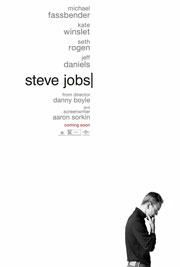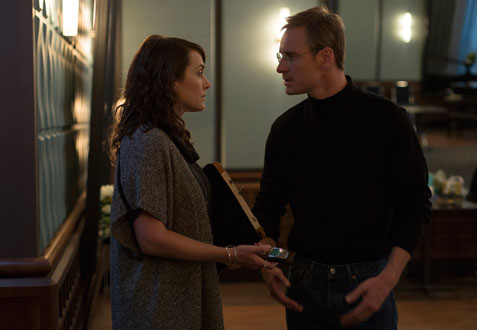
Most biopics go to great lengths to humanize their subjects, to show that even the great ones are flawed in some way. “Steve Jobs” sets its subject on fire, and then pokes the body with a stick for 122 minutes. They make it clear from word one that Jobs was a sociopath, blinded by ambition and seemingly incapable of empathy or love. He was an insufferable boss and an even worse father, yet the son of a bitch changed the world.
And the thing is, those are all okay elements to include in the film of someone’s life. More often than not, though, those pieces aren’t the whole story. Here, they are, and it’s framed within a narrative that seems designed to make the audience even more uncomfortable. “Steve Jobs” is well written and well-acted, but it is not an easy movie to like, let alone love. It challenges the audience, and that is an admirable thing, as long as they’re willing to suffer the consequence that people may ultimately decide that they don’t like the movie because the supposed protagonist is an unrepentant jerk.
The film covers three product launches, peppered with a few informative, non-linear flashbacks, over the course of 14 years. The first one takes place in 1984, where Jobs is about to launch the Macintosh. Ridley Scott’s “1984” ad during the Super Bowl had everyone talking, and now it is up to Jobs to deliver. The only problem is, the Mac isn’t ready, and yet he still tells the press that he anticipates record-shattering sales. Before he makes his presentation, though, he has to deal with Chrisann Brennan (Katherine Waterston), mother of Jobs’ daughter Lisa, though he refuses to acknowledge Lisa as his daughter. Next up is Steve Wozniak (Seth Rogen), the man with whom he invented the first Apple computer in a garage, and the two are still quibbling over what turned out to be game-changing innovations that Jobs rejected out of hand.
Lastly, there is John Sculley (Jeff Daniels), Apple’s then-CEO. Jobs has a moment with Lisa, Woz and Sculley at every launch, each with varying degrees of contrition at different times. Still, it’s pretty clear that Steve Jobs was a first-class asshole, and every one of them has a right to be angry with him. Are we having fun yet?
It’s interesting to see a major studio make a film about a man who’s revered in Hollywood circles – Apple’s inventions have certainly made modern-day filmmaking easier, that’s for sure – and have the nerve to beat him to a pulp. One wonders if that was how they got Danny Boyle (“127 Hours,” “Slumdog Millionaire”) to sign on as director in the first place. He’s not one to make a puff piece; hell, they probably pitched it to him as the “Trainspotting” of biopics, and that’s an apt description. This is brutal stuff, the kind of movie that makes people feel good about themselves because they’re not Steve Jobs.
There is a wealth of acting talent in this film, yet surprisingly, Kate Winslet proves to be the film’s biggest weakness. Playing Apple’s marketing director and unofficial Jobs assistant Joanna Hoffman, she sounds as American as apple pie until Jobs mentions her Eastern European background, after which her accent slips into gear, only to falter later. Daniels might seem out of place with this group, but he is well versed at speaking “Steve Jobs” screenwriter Aaron Sorkin’s dialogue during his time on “The Newsroom,” and more than holds his own against Fassbender. Fassbender, meanwhile, plays Jobs exactly as he is written: petty, driven, paranoid and confident that he’s the smartest guy in the room. The flashiest thing about his performance are the multiple hairstyles he sports throughout the film, and that is the right call. Boyle opts to keep the camera work simple, save for a couple of fun shots of a crowd doing the wave before the Macintosh launch. He kept the focus on his main character, and again, that is the right call.
“Steve Jobs” is the ultimate anti-biopic. It’s the story of a guy whose greatest skill is manipulating everyone around him to bend to his will; they make a point of that in the film, though they use a much more flattering analogy. However, it is also a film without mercy which, considering the subject, is fitting, but it comes with the guarantee that no one will walk out of this movie thinking better of him than they did when they walked in. In a way, one can make the argument that Jobs got the movie that he deserved.
Related Posts
Comments Off on Movie Review: “Steve Jobs”
Posted in: Entertainment, Movie Reviews, Movies
Tags: Aaron Sorkin, Danny Boyle, Kate Winslet, Michael Fassbender, Seth Rogen, Steve Jobs
















